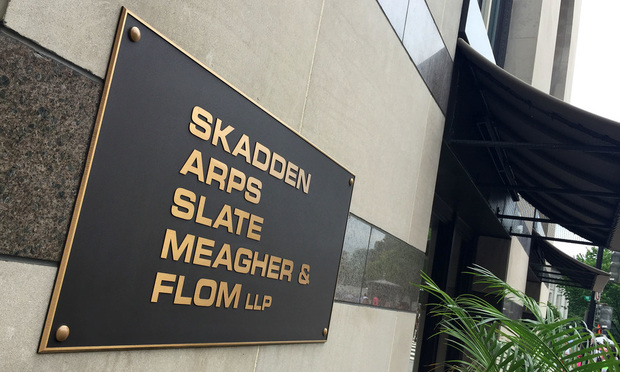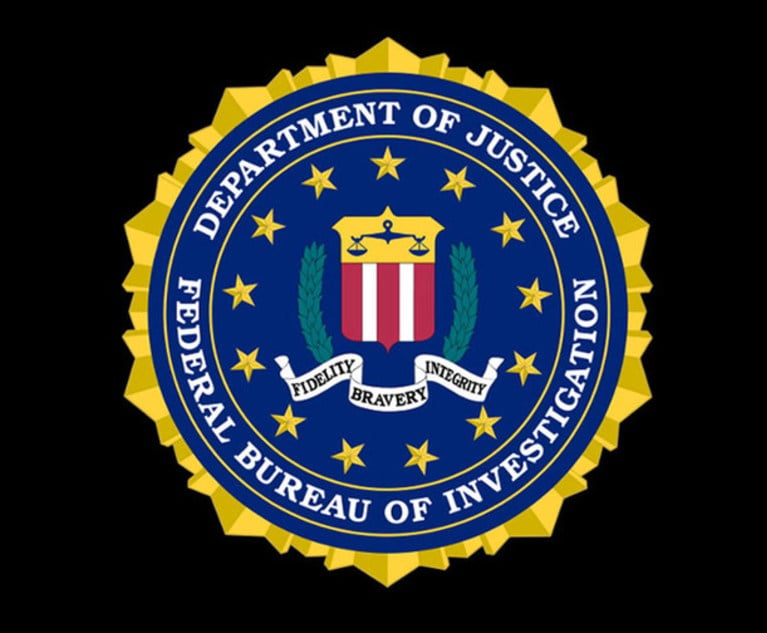How Skadden's Michael Scudder Got Trump's Nod for Seventh Circuit Seat
Three things to know from Skadden partner Michael Scudder's U.S. Senate questionnaire.
February 28, 2018 at 12:21 PM
6 minute read
 Skadden offices in Washington, D.C. Credit: ALM
Skadden offices in Washington, D.C. Credit: ALM Chicago lawyer Michael Scudder got a call from the White House counsel's office one day after a vacancy opened up on the U.S. Court of Appeals for the Seventh Circuit.
Scudder, a litigation partner at Skadden, Arps, Slate, Meagher & Flom since 2009, said the White House call came on June 6. Judge Ann Williams took senior status the previous day, judiciary records show.
Scudder traveled to Washington about a week after the call to interview at the White House counsel's office and the U.S. Justice Department's Office of Legal Policy, according to his U.S. Senate questionnaire. In October, Scudder was back in Washington to meet separately with U.S. Sens. Dick Durbin and Tammy Duckworth, both Democrats from Illinois.
The White House told Scudder on Dec. 4 he would be recommended to fill a vacancy on the appeals court. By that time, there were two slots open—one for Williams and another for Richard Posner, who retired in September. Williams, the appeals court's first African-American judge, has since joined the Chicago office of Jones Day.
The White House counsel's office reached out to U.S. District Judge Amy St. Eve of the Northern District of Illinois on June 22 about her interest in a slot on the appeals court. She interviewed five days later with the White House counsel's office, according to her Senate questionnaire. St. Eve, a federal trial judge since 2002, spoke with Durbin and Duckworth on the phone in December, and the White House told her on Dec. 6 that President Donald Trump intended to nominate her to the appeals court.
Scudder, a former clerk to Justice Anthony Kennedy, was picked to fill Posner's seat, and St. Eve would snag the Williams vacancy. The White House announced both nominations on Feb. 12. What follows are some highlights from Scudder's Senate questionnaire.
Scudder is a former White House lawyer in George W. Bush's administration, and he once publicly recalled telling “no” to the president about a new national security initiative.
Scudder recounted the memory in March at the Midtown Educational Foundation in Chicago. Here's how the foundation wrote it up: “Scudder was tasked with determining the legality of the initiative, and after hours of consideration with others, determined that there was no legal way to move forward. After Scudder reported his findings, he was asked to start from scratch and to try again. Scudder did just that, only to come to the same conclusion. Describing his interaction with the president as 'almost nose-to-nose,' Scudder reiterated his findings, to which the president replied, 'Do you have any idea how much this upsets me?' Scudder meekly replied, 'Yes sir, I do,' to which the president responded, 'OK then, we won't do it.'”
Scudder joined the Bush White House in 2007 from the U.S. Justice Department, where he was a top lawyer in the deputy U.S. attorney general's front office.
Scudder's practice primarily focuses on corporate clients facing accounting matters, but he has been the lead Skadden attorney on the team defending the University of North Carolina in a challenge to the school's admissions policy.
UNC permits considerations of race and ethnicity in the admissions process. The advocacy group Students for Fair Admissions Inc. sued the university in 2014. UNC's motion to dismiss, filed in October, argued that the advocacy group isn't eligible for “representational standing.”
Scudder also noted he was a lead lawyer for Toyota Motor Corp. in multidistrict litigation over claims rooted in alleged unintended acceleration. Scudder told the Senate he worked on key legal issues. The case settled in the U.S. District Court for the Central District of California. His opposing counsel was Steve Berman of Hagens Berman Sobol & Shapiro.
Scudder a long time ago was a Jones Day associate in the firm's Cleveland office, where he worked on appeals and trial briefs. He said in his questionnaire that he went to law school—Northwestern University Pritzker School of Law—wanting to be a corporate mergers and acquisition lawyer. He'd spent two years, before law school, working in public accounting at Ernst & Young.
Scudder has long been an advocate of pro bono service. “Not only do I regularly volunteer to represent indigent clients and serve on the boards of charitable organizations, I steadfastly encourage others to do so,” Scudder wrote in his Senate questionnaire.
“I often hear—and strongly disagree with—the view that a steady and active commitment to pro bono work and community service is incompatible with a successful career in private practice, especially at large law firms. I have written several articles, including in national publications, addressing and refuting this perspective.”
Writing at The National Law Journal in 2015, Scudder said: “There is something unsettling and artificial about shying away from any discussion of such an important part of the legal profession during on-campus interviews. This hesitancy risks creating the mistaken view that there is no place in private practice for lawyers to serve private clients while also working for the public good.” And more: “Reality and idealism can co-exist in our profession. Young associates can give their all for the firm's paying clients while making time to take on a criminal or habeas corpus appeal, help an organization acquire tax-exempt status, represent an indigent client, or serve on a charitable organization's board.”
At Skadden, Scudder said he's supervised or participated in 75 pro bono cases.
Scudder's Senate questionnaire is posted in full below:
Read more:
Skadden Partner Michael Scudder Picked for Seventh Circuit Seat
7th Circuit Pioneer Joins Jones Day to Fight for Rule of Law
Trump Judicial Nominee Withdraws After Flunking Senate Hearing
Additions to Senate Judiciary Fuel Hope for Greater Focus on Diversity in Court Picks
How Trump Is Changing the Game on Judicial Nominations
A Judge Who Speaks His Mind: Richard Posner's Greatest Quips
Scudder: Firms Should Support Graduates' Goal to Provide Pro Bono Service
This content has been archived. It is available through our partners, LexisNexis® and Bloomberg Law.
To view this content, please continue to their sites.
Not a Lexis Subscriber?
Subscribe Now
Not a Bloomberg Law Subscriber?
Subscribe Now
NOT FOR REPRINT
© 2025 ALM Global, LLC, All Rights Reserved. Request academic re-use from www.copyright.com. All other uses, submit a request to [email protected]. For more information visit Asset & Logo Licensing.
You Might Like
View All


Big Tech Is Cozying Up to President Trump. Here's Why Their Lawyers Are Cautiously Optimistic

Supreme Court Agrees to Hear Lawsuit Over FBI Raid at Wrong House
Trending Stories
- 1Law Firms Report Wide Growth, Successful Billing Rate Increases and Less Merger Interest
- 2CLOs Face Mounting Pressure as Risks Mushroom and Job Duties Expand
- 3X Faces Intense Scrutiny as EU Investigation Races to Conclusion & Looming Court Battle
- 4'Nation Is in Trouble': NY Lawmakers Advance Bill to Set Parameters for Shielding Juror IDs in Criminal Matters
- 5Margolis Edelstein Broadens Leadership With New Co-Managing Partner
Who Got The Work
J. Brugh Lower of Gibbons has entered an appearance for industrial equipment supplier Devco Corporation in a pending trademark infringement lawsuit. The suit, accusing the defendant of selling knock-off Graco products, was filed Dec. 18 in New Jersey District Court by Rivkin Radler on behalf of Graco Inc. and Graco Minnesota. The case, assigned to U.S. District Judge Zahid N. Quraishi, is 3:24-cv-11294, Graco Inc. et al v. Devco Corporation.
Who Got The Work
Rebecca Maller-Stein and Kent A. Yalowitz of Arnold & Porter Kaye Scholer have entered their appearances for Hanaco Venture Capital and its executives, Lior Prosor and David Frankel, in a pending securities lawsuit. The action, filed on Dec. 24 in New York Southern District Court by Zell, Aron & Co. on behalf of Goldeneye Advisors, accuses the defendants of negligently and fraudulently managing the plaintiff's $1 million investment. The case, assigned to U.S. District Judge Vernon S. Broderick, is 1:24-cv-09918, Goldeneye Advisors, LLC v. Hanaco Venture Capital, Ltd. et al.
Who Got The Work
Attorneys from A&O Shearman has stepped in as defense counsel for Toronto-Dominion Bank and other defendants in a pending securities class action. The suit, filed Dec. 11 in New York Southern District Court by Bleichmar Fonti & Auld, accuses the defendants of concealing the bank's 'pervasive' deficiencies in regards to its compliance with the Bank Secrecy Act and the quality of its anti-money laundering controls. The case, assigned to U.S. District Judge Arun Subramanian, is 1:24-cv-09445, Gonzalez v. The Toronto-Dominion Bank et al.
Who Got The Work
Crown Castle International, a Pennsylvania company providing shared communications infrastructure, has turned to Luke D. Wolf of Gordon Rees Scully Mansukhani to fend off a pending breach-of-contract lawsuit. The court action, filed Nov. 25 in Michigan Eastern District Court by Hooper Hathaway PC on behalf of The Town Residences LLC, accuses Crown Castle of failing to transfer approximately $30,000 in utility payments from T-Mobile in breach of a roof-top lease and assignment agreement. The case, assigned to U.S. District Judge Susan K. Declercq, is 2:24-cv-13131, The Town Residences LLC v. T-Mobile US, Inc. et al.
Who Got The Work
Wilfred P. Coronato and Daniel M. Schwartz of McCarter & English have stepped in as defense counsel to Electrolux Home Products Inc. in a pending product liability lawsuit. The court action, filed Nov. 26 in New York Eastern District Court by Poulos Lopiccolo PC and Nagel Rice LLP on behalf of David Stern, alleges that the defendant's refrigerators’ drawers and shelving repeatedly break and fall apart within months after purchase. The case, assigned to U.S. District Judge Joan M. Azrack, is 2:24-cv-08204, Stern v. Electrolux Home Products, Inc.
Featured Firms
Law Offices of Gary Martin Hays & Associates, P.C.
(470) 294-1674
Law Offices of Mark E. Salomone
(857) 444-6468
Smith & Hassler
(713) 739-1250








